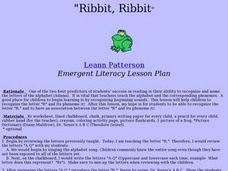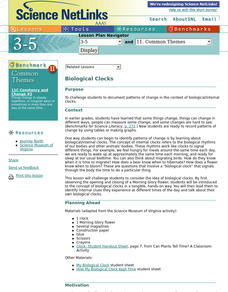Curated OER
Get Ready, Get Set, Hibernate
Students match each body part or idea from a work bank about methods of animal adaptations for winter survival. They observe as the first one, food is covered with the whole class before completing the rest of the diagram. They discuss...
Core Knowledge Foundation
A Time for All Seasons - Winter
As the days get shorter and a chill enters the air, it's time to start teaching your little ones about the wondrous winter season. Through a series of teacher demonstrations, whole-class read alouds and discussions, and hands-on...
Curated OER
Responses to Changes in the Environment
Fourth graders study ecosystems, and see how plants and animals must adapt to changes in their environment in order to survive. Pictures of the snow shoe hare in the winter and summer are shown. Learners determine that the change in...
Curated OER
Plant and Animal Changes
Second graders listen as the book, "What Do Animals Do In Winter?" is read to the class. They discuss that during the winter, some animals migrate, hibernate, hide, change color, and some make changes in their bodies like growing extra...
Core Knowledge Foundation
A Time for All Seasons - Fall
The weather is cooling down and the leaves are starting to change color; fall is right around the corner. Celebrate this special time of year with this earth and life science lesson series that teaches children about the...
ARKive
Animal over Winter
Gosh those polar regions can get cold. So, how do the animals that live there survive the long winters? Learners explore how animals adapted to survive harsh wintry conditions by completing a worksheet and comparing animal survival...
Curated OER
Animals, Soil, Trees
Fourth graders describe the various kinds of soils and how plants and animals are affected by them. They describe the baic needs of plants, scoring at least a 3 or 4 on a 4-point rubic. Students are able to predict and/or infer what...
Curated OER
Animal Adaptations to the Cold
Student's explore the concept of animal adaptations. In this animal science lesson, students create insulated mittens and conduct an investigation with cold water. Students discuss the results and make connections to animals...
Curated OER
Awesome Adaptations!
Second graders explore biology by researching animal characteristics. In this adaptation instructional activity, 2nd graders identify the history of several animals and research the changes that have occurred to their anatomy over...
Core Knowledge Foundation
A Time for All Seasons - Summer
The sun is shining and the birds are singing, what better time to teach young learners about the fun season of summer. In this week-long science series, children learn how the rotation and orbit of the earth influence...
Curated OER
Science: Why Animals Hibernate
Second graders investigate the reasons animals hibernate. They measure their own heart rates and compare them to those of a hibernating bear. In their journals, 2nd graders record facts about and characteristics of hibernation and...
Curated OER
Reptiles and Amphibians
Introduce your class to various reptiles and amphibians. They will meet and identify a representative from each of the four major reptile families, then learn about and discuss reptile characteristics. Next, they will identify and...
Curated OER
Blubber Mittens:Adaptation to Cold Climates
Students get a first hand look at the benefit of a "blubber layer" in cold climates through a simulation using vegetable shortening and icy water. Through this simulation, students examine how adaptations help organisms survive.
Curated OER
Winter Season
Students recognize the relationship between Earth's tilt and the Winter season. In this Winter instructional activity, students work in pairs to complete make frost and design snow goggles. Students experiment a hand lens to study the...
Curated OER
Reptiles and Amphibians
Fourth graders explore biology by viewing animal videos in class. In this amphibian and reptile instructional activity, 4th graders identify the key differences between reptiles, amphibians and other animal classifications. Students view...
Curated OER
Predator Prey Population Links
Fifth graders relate population of animals to its available food supply. They participate in an experiment and gather information. They use the data to draw conclusions.
Curated OER
Make a Cast of a Tyrannosaurus rex Fossil
Second graders examine the formation of fossils and list the different types. They make cast model of a dinosaur fossil. They write about conditions that are necessary for fossils to form and create a model of a buried fossil.
Curated OER
Tick-Tock: Biological Clock
Students complete several activities that stimulate their assessment of time. They consider the term 'biological clock' and how animals in the wild depend on their own internal clocks for survival.
Curated OER
Bugsicles (A Frozen Insect Larva You can Find!)
Students explore how animals survive in the winder. After attending a gall-collecting field trip, students place them in a freezer. Once frozen, the students open the gall flay larva and observe it as the larva revives. Students...
PBS
Season Seeking
It's a time of change. A hands-on activity engages young scientists in a lesson highlighting the change of seasons. They brainstorm indicators of season changes in nature and then look for them. Next, they record observations in a field...
Curated OER
Ribbit! Ribbit!
Students research a frog's life cycle and habitat using books, the Internet and lecture. Students make origami frogs, write letters to Toad from Arnold Lobel's "Frog and Toad" and participate in a simulated camouflage activity.
Curated OER
Water 1: Water and Ice
Students investigate water in its solid and liquid form. In this states of matter instructional activity, students experiment to see what happens as water goes from a solid, ice, to a liquid, water, and back again. They write about and...
Curated OER
Spy on a Spider
Students view slides or live specimens to name and describe the distinguishing features of groups of arthropods, especially spiders and insects. They complete worksheets, observe webs and then search for and record where spiders can be...






















